This recipe for Vietnamese Pickled Vegetables using carrots, cucumbers and daikon radishes is quick pickled. That means they are done in an hour or two and last weeks in the fridge. They are the perfect side dish to burgers or ribs.
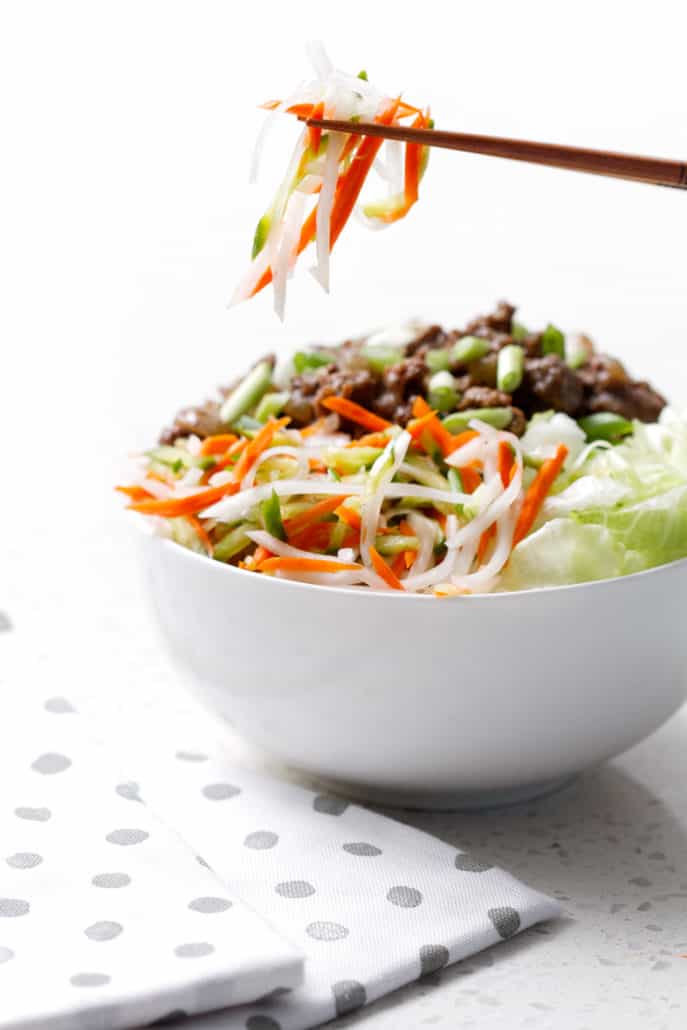
Old school pickling scares me a little as I don’t want to poison my loved ones or myself. It’s also super time consuming. Maybe one day I’ll conquer pickling but not while I’m wrangling my young son. So, quick pickling is more my speed and allows me to indulge my love of pickles using high quality ingredients that won’t made me ill.
This quick pickle recipe ends up on a lot of Vietnamese dishes. I always see them in salads and along side meat dishes at my favorite Vietnamese restaurants. I’ve included them in my Beef Bowl. It’s a nice way to cut the fattiness of the meat like ribs (try my Slow Cooker Cardamom Ribs) or chicken thighs (try my Italian Chicken). Although I have a tendency to just eat them right out of the jar.
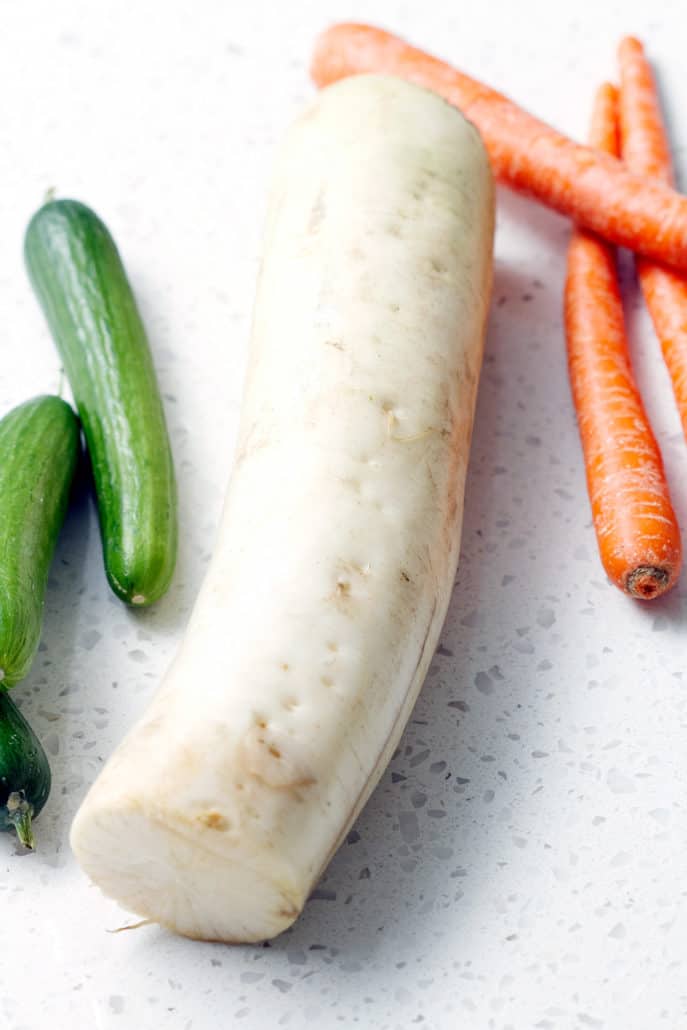
Pickled vs. Fermented
Just to be clear, these are quick pickled or refrigerator pickles. However, they are not fermented pickles. Often times they are lumped together but they are not always the same thing.
Pickling is when something is preserved in brine (salt and water) or an acid (lemon or vinegar). Fermenting is when food is preserved and transformed by bacteria.
Here’s where it gets confusing. Some fermented foods are pickled, and some pickles are fermented. But not all fermented foods are pickles! And not all pickles are fermented!
For instance, kimchi, is both pickled and fermented because it uses salt AND bacteria to preserve the cabbage. Kombucha is not pickled because there’s no salt involved. It is fermented because the good bacteria grows from the sugar. Sourdough, beer and yogurt are all fermented foods that are not considered pickles.
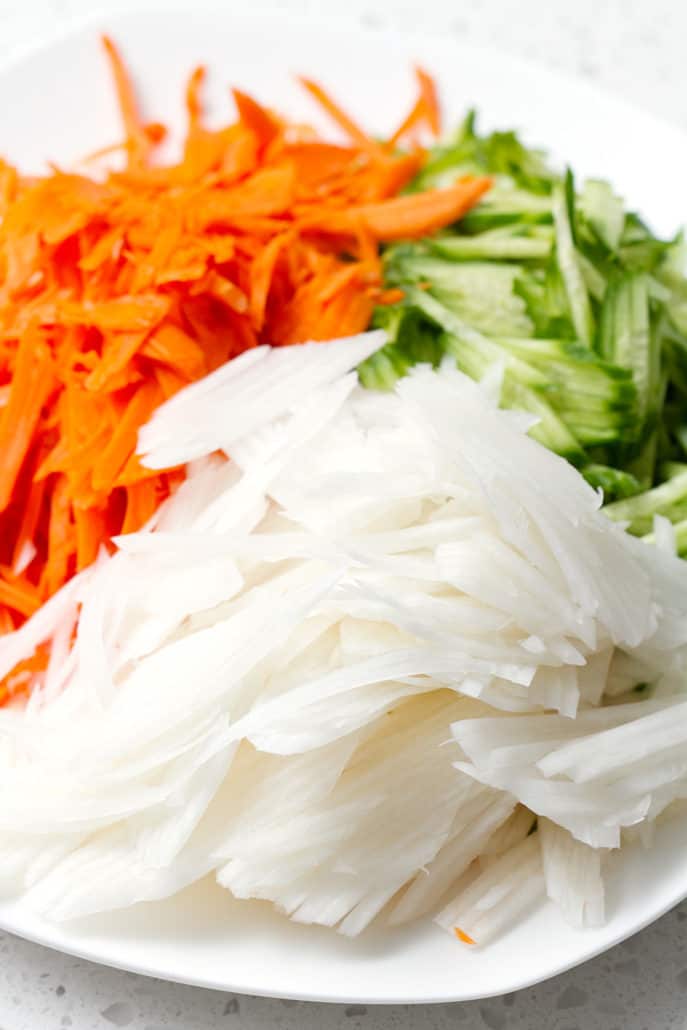
How to make homemade pickles?
Homemade pickles are actually really easy to make. It just takes a few simple ingredients (vinegar and salt) to make homemade pickles! I added a few other ingredients to make my AIP friendly version of Vietnamese Pickled Vegetables.
Again, I’m not talking about fermenting or canning so that they are shelf stable. Both of those processes seem like a labor-intensive task that may or may not end up with my family being poisoned. There are some added health benefits of fermented foods but it’s not something I’m interested in doing at home just yet. [Source]
When I learned about quick pickles or refrigerator pickles, I was thrilled. I can have the same taste without risking poison and potentially wasting a ton of food.
What vegetables are good for pickling?
Many vegetables can be pickled. Here are my favorites:
- Radishes
- Cucumbers
- Asparagus
- Red Onions (Here’s a link to my Pickled Red Onion Recipe)
- Cauliflower
- Fennel
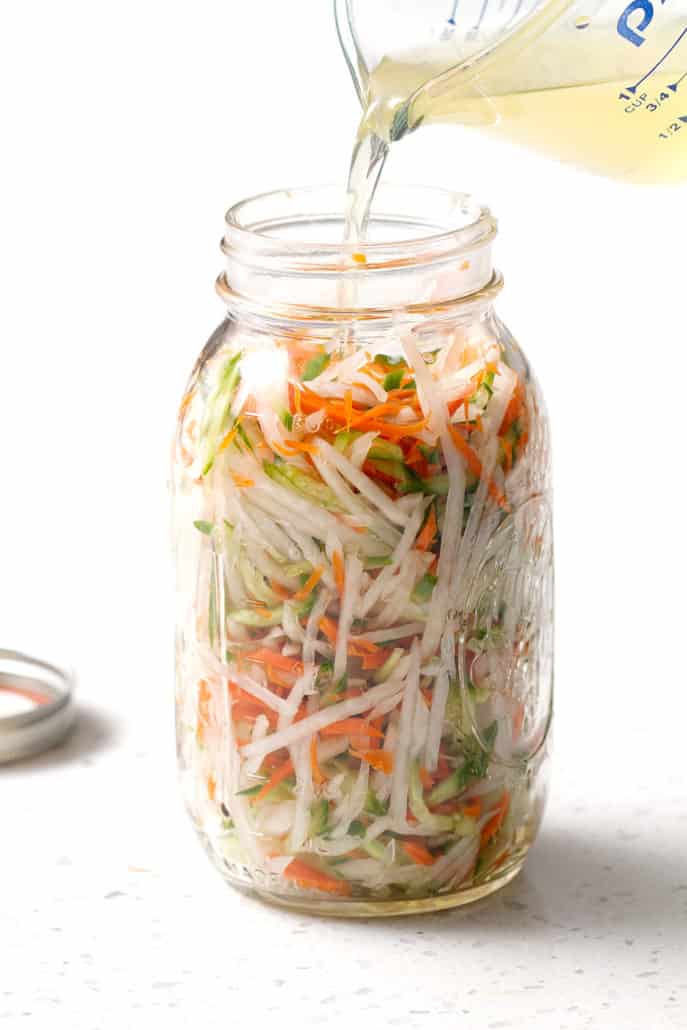
How long do pickled vegetables last?
While this Vietnamese Pickled Vegetables recipe lasts about 4 weeks in the fridge, please note that the texture will start to change. The longer they sit, the more likely they are to become soggy. I prefer to eat my pickled vegetables in under 2 weeks.
Please be aware that this is a quick pickled or refrigerator pickle recipe. That means this recipe is not fermented or shelf stable. These quick pickled vegetables must be stored in the refrigerator.
Are pickled vegetables healthy?
Pickles that are not fermented still deliver the benefits of vinegar and the veggies used. For me, it’s honestly about adding new flavors to vegetables so keep them interesting.
Which vinegar is best for pickling?
Distilled vinegar is the most common vinegar for pickling, which is part of the reason I’m making these Vietnamese Pickled Vegetables recipe at home. There’s no reason why you can’t use apple cider vinegar or red/white wine vinegar when pickling at home.
Are pickled foods good for your gut?
The easy answer is yes. There is definitely a health benefit to eating vegetables. However, fermented pickled vegetables would have an even added benefit to your gut health over quick pickled vegetables. However, you can get those benefits from other sources like kombucha, coconut milk yogurt, coconut milk kefir, and water kefir. [source]
I think the most important thing is to maintain a diverse diet and not rely on any one food for all your nutrients.
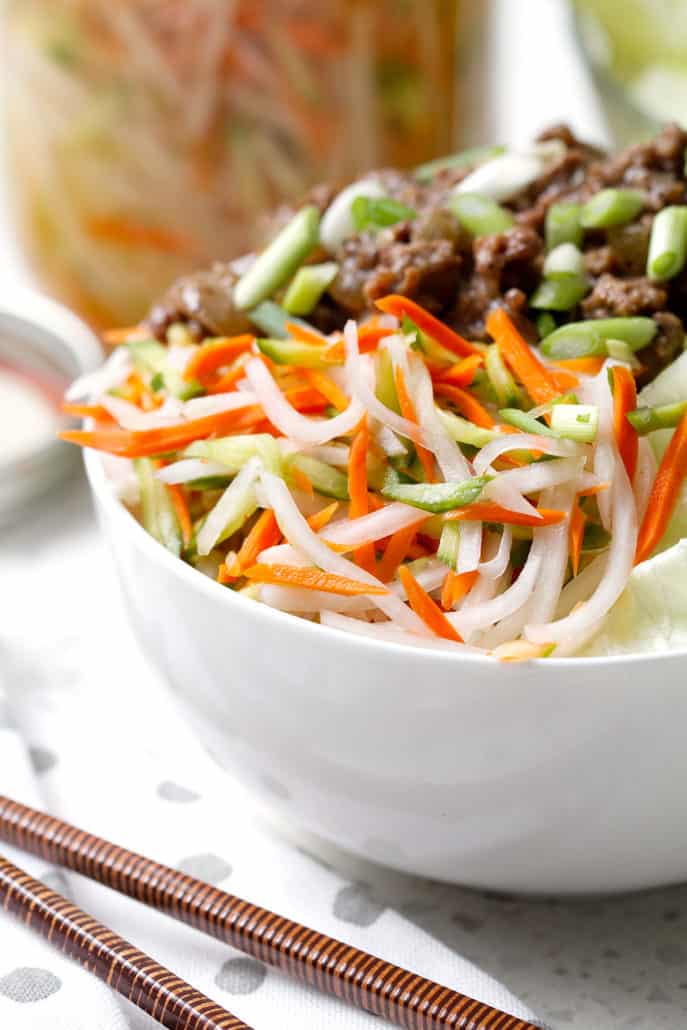
Vietnamese Pickled Vegetables
Asian twist. They are a great condiment or side. This recipe is AIP, Paleo and
Vegetarian.
Ingredients
- 1 1/2 cup White Wine Vinegar (Rice Vinegar would be a great substitute however it's not AIP. Rice is a AIP Reintroduction.)
- 1/2 cup Warm Water
- 1/4 cup Honey
- 1/2 teaspoon Salt
- 1 cup Carrots, peeled and shredded about 3
- 2 cups Daikon, peeled and shredded about 1/4 large
- 1 cup English Cucumbers (about 3 Persian Cucumbers would be a good substitute)
Instructions
- Put vinegar, water, honey and salt into a large bowl and whisk until the honey is dissolved.
- Add carrots, daikon, cucumbers and toss to combine.
- Cover and refrigerate for at least 1 hour or up to several hours before serving.
Notes
Nutrition
Do you like this recipe? Be sure to share this recipe on Pinterest or leave a comment below!



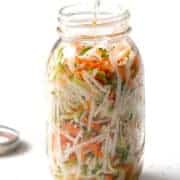
Where's the step where you heat up the pickling brine and pour it over the vegetables to quick pickle them? Then cover and allow to cool to room temperature, then place in fridge. Otherwise your veggies won't have the right texture as you would find on a bahn mi sandwich.
These are quick pickled veggies. The process if different. Additionally, I've found the texture to be pretty close to those with more traditional pickled methods.
These are not Vietnamese pickled vegetables. Do chua does NOT have cucumbers in it. Claiming something is Vietnamese without understanding the culture is disrespectful.
I meant no disrespect by adding cucumbers to this recipe. My Vietnamese family is not offended by the cucumbers. However, I understand that they do not represent all Vietnamese people. In addition, I included in the content of the recipe post that this is an AIP friendly adaptation and had to make many substitutions to make this fit within the constraints of the AIP diet. Most do chua aren't made honey or white wine vinegar which means the only traditional ingredients in this recipe is the daikon and carrots. The cucumbers were added if daikon radishes weren't available as I have readers from all over the world. And for those of us with chronic illnesses that have had to make many adaptations to their diets, recipes like this one really help them enjoy a variety of foods and cultures. Without recipes like this one, we'd just have to go without. While I love and respect traditional Vietnamese dishes, that's not what this blog is about. I write the content and recipes on this website for people with chronic illness which means substitutions will be abundant. On all recipes.
I work for Vietnamese and pickled carrots and cucumbers is on many of there dishes. You are no less disrespectful by yelling at someone who means no harm. And if you where respectful you would read the entire page showing how she explains whats known to be authentic and what isnt. Take a vacation!
❤️❤️❤️
Emma,
If you knew anything about food culture, you would understand the food, all food, has no single origin, with little exception.
A large part of what the world knows as Mexican food is based on Lebanese food. And, Lebanese food is flavored with spice trades from Asia. Spaghetti is not Italian. It is from the Arab world and the more than likely from Asia. How about that famous tomato sauces for which Italy is now synonymous? That only began in the 1500s and was imported from the New World. For that matter, pizza is flat bread with tomato sauce and cheese on it. Flat bread exists in one form or another for thousands of years.
Each of these cultures have their regional food cultures based on local produce and resources going back millennia, but the past (well over) 500 years of global trade have impacted all food culture, everywhere.
It is not for you, or anyone, to claim cultural appropriation because the last time you ate a taco you probably called it Mexican food instead of Lebanese food.
❤️❤️❤️
what is "AIP" ?
Here is a article about the AIP diet: https://thehonestspoonful.com/what-is-the-aip-diet/
I'm wondering if you brine the cucumber, carrot and daikon with pickling salt for min 12 hours, rinse well, then follow your recipe, would I be able to can a large bunch for pantry?
I have no idea how to safely make this recipe shelf stable using traditional methods.
Are the cucumbers shredded as well?
Yes. Everything is shredded in this recipe.
You don't mention what kind of salt to use. I have pickled for canning in the past and used "pickling salt". It makes the liquid less cloudly I believe. I think I will do that with this, mostly for looks. There are so many types of salt available these days besides table salt. I have a recipe for another quick pickle that uses hot pepper chili flakes, some might want to add that for some spice. I use carrot sticks and green beans for that one. I will try this, I think my granddaughter will like it.
This is a quick pickle recipe. You don't need any special salt like pickling salt. I just used sea salt. I hope your granddaughter enjoy the recipe!
Can't wait to try this! Would it work with red cabbage?
Yes! Red cabbage would work but the flavor is slightly different than green cabbage.
While bacterial species may be important in the preservation or taste development of fermented foods, the bulk of fermentation is actually done by yeasts, which are different from bacteria. This is especially true of breads and alcohols (beer). You might want to mention both types of organisms in your fermentation discussions or just use the more inclusive term “microorganisms”.
Cheers
Thanks for pointing this out. I'm going to leave this comment here so people can understand the difference. Thanks again for commenting!
I tried this recipe with mung bean sprouts and it was delicious! Thank you!
Awesome. Mung bean sprouts are an AIP reintroduction so great job. It's very traditional and delicious addition.
Tastes just like Mrs. Yamaguchi's mung bean sprout pickles we loved many years ago!
How would it be if I left the sweetner out ? Trying to live without any type of sugar.
I don't know. It may be a little too acidic from the vinegar. The honey gives it some depth and flavor. Give it a try. Let me know if it works!
Easy enough. I used my spiralizer. Just put a batch in the fridge. Not as easy as I thought to measure twisty pieces of carrots and daikon radish. I am looking forward to trying these.
I hope you enjoy! Thanks for leaving a comment.
Can you make a large batch and process for canning?
It would be easy enough to double the batch but I've never canned it before. Actually, I've never done anything beyond refrigerator pickles before so I can't advise you on traditional canning. If you try it, let me know. I'd love to know how it works out.
Directions read to add sugar, I don’t see sugar listed as an ingredient? I’m confused lol
Good catch! That should have read to add honey not sugar. I've updated the recipe. Thanks for letting me know about the error!
Perfect on Banh mi sandwiches.
Agreed!
This looks great! I really want to try pickling my own veggies, and I think this is definitely a good starting point. Thank you for including pictures as well, it is a very easy to follow recipe!
Thanks! I hope you enjoy the recipe.
Where did the onions come from? Is that a typo?
Hi Morgan. There are no onions in the recipe. That was a typo which has been corrected. Thanks for bringing it to my attention!
Making these as we speak (PS - the onion typo is still there.)
I had a technical glitch. My site put back a lot of things that I has previously updated. Super annoying but it's all fixed now. Hope you enjoy the recipe!
How long do the pickled vegetables last for once made?
I've never had any left after a week or so. However, pickled veggies usually last about a month on the refrigerator.
I do like this recipe. Am anxious to make it. Thank you for sharing.
Great!